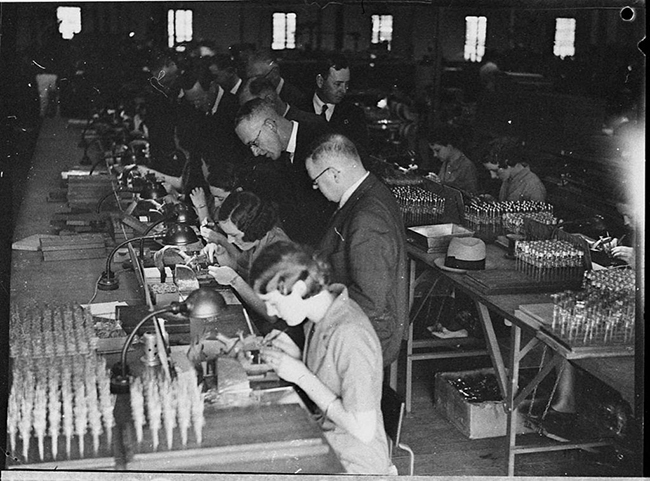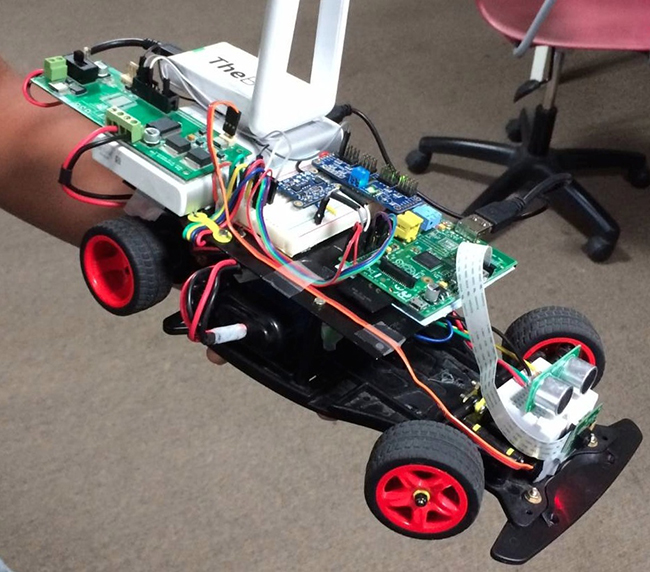Disclaimer: The statements and opinions expressed in this article are those of the author(s) and do not necessarily reflect the positions of Thoughtworks.

We are at a critical juncture in the evolution of human society. We can continue to live in a world where many of us are nothing more than cogs in a machine, or we can choose to fashion a society that values the potential and power and beauty of every individual. Advancements in automation and computerization are part of the rapidly changing conditions that present us with this choice.

Caption: Workers at the AWA factory, Ashfield, NSW, 1936. Photo By Crico at en.wikipedia from Wikimedia Commons.
In light of recent developments in technology, the Open Society Foundation has undertaken a yearlong, collaborative investigation into the effects of automation and computerization on employment and economic conditions. An Oxford Study from September 2013 shows that 47% of US jobs are at risk of being displaced by automation and computerization. The study examined over 700 occupation types to reveal which may be vulnerable in the coming decades and finds that the precarious jobs are not limited to those based on computation and routine tasks. Google's self-driving car, for example, proves that new technology can perform both routine and non-routine tasks, as well as manual and cognitive work, potentially rendering humans redundant to driving and navigation.
One of the dangers of this rise in automation is its potential effects on wealth inequality. While in some cases, the automation of jobs can provide relief from mundane tasks, for many workers, these developments represent a severe threat to their wellbeing and livelihood. The study shows that as computerization has developed, it has replaced a number of middle-income jobs based on skilled labor. We are seeing a modest increase in the number of high-income cognitive jobs, but the most significant trend has been that, as demand for skilled labor is displaced by automation, those workers are forced into low-paying manual occupations. These low-income jobs are often referred to collectively as the “services sector,” represented by food service, janitorial, and other types of labor. This has resulted in a hollowing out of middle-income jobs, and a much larger increase in low-wage labor.
At an Open Society Foundation event in March 2014, academics, labor leaders, community organizers, and business leaders discussed the consequences of these developments for social and economic justice. Rather than fight new technology, many attendees made the point that the way these developments change society will be a matter of political struggle and popular will. As jobs are displaced, we can pursue policy platforms that strengthen the social safety net and ensure that workers who have been pushed out of the labor force are able to meet their basic needs. The Universal Basic Income was mentioned as an important policy alternative, one which has been on the agenda several times in US history.

Caption: TheBot, built by Thoughtworkers in 2014.
As automation and computerization develop, new technologies will disrupt the lives of many workers. But these developments will also create large surpluses of wealth through gains in efficiency. We can choose where and how that wealth is directed. If we want to live in a society that defines many people as redundant parts of a surplus population, we should sit back and hope for the best. But if we value the life and dignity of each and every individual, then we need to get involved in ensuring that the future we live in will be a future where the benefits of changes in technology are justly distributed for all.
The consequences are not inevitable. They are up to us. Please comment and let us know how you think we should take action now!
More reading on the Universal Basic Income:
Disclaimer: The statements and opinions expressed in this article are those of the author(s) and do not necessarily reflect the positions of Thoughtworks.
